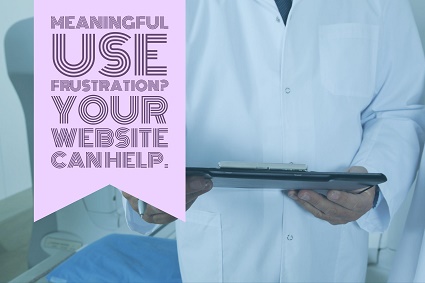Your cart is currently empty!

Meaningful Use and Your Website
The HITECH Act of 2009 set out goals for bringing medical records out of the paper quagmire and into Electronic Health Records (EHR) systems that would allow patients and healthcare providers across the nation to keep synchronized. Not only would this initiative save money and standardize care, but it would empower patients and improve medical care while saving the nation billions of dollars. Medical practices were offered tens of thousands of dollars a year in incentives, and as of last year, adjustments to Medicare and Medicaid payments created penalties for failing to participate.
These are the pillars of meaningful use of EHR:
- Improve quality, safety, efficiency, and reduce health disparities.
- Engage patients and families in their health.
- Improve care coordination.
- Improve population and public health.
- Ensure adequate privacy and security protection for personal health information.
Years passed and confusion grew over certification of EHR solutions, definitions of “meaningful use,” and how exactly compliance would be measured. In October 2015 a “final rule” was issued which addressed these concerns. Some of the criteria were made easier to reach. For example, this year eligible providers must make it possible for more than half of patients to view and download their medical records, but only one patient must actually do so to meet the requirement (percentage engagement requirements will come back into play in the future). Deadlines were pushed out. Exclusions were granted for healthcare professionals working in areas where public health communication opportunities were limited. For example, if you work in an area where there is no immunization registry, you’re not penalized for failing to report immunizations to the public immunization registry.
Even so, by the end of 2015 almost half of all office-based doctors still hadn’t met the requirements for meaningful use. More than 90% of U.S. hospitals have done so, but healthcare professionals in private practice are finding it challenging. We’ve been told that it’s impossible, or at least unaffordable, by doctors in our community, where 70% of physicians have adopted certified EHR solutions but just about half have demonstrated meaningful use.
A certified EHR solution with a secure patient portal is central to achieving all the standards for meaningful use. Good integration of that portal into your website makes all the difference between electronic records to replace your paper files, and meaningful use.
But there are other ways that your practice website can assist with meaningful use:
- Offer patient education materials online.
- Offer patient education materials that can be downloaded, printed, and given to patients without internet access (for Stage 1 and Stage 2; paper-based communication is not included in Stage 3).
- Provide links to patient-specific education materials identified by a certified EHR.
- Allow secure messaging for questions and prescription refill requests.
- Offer online bookings and automatic reminders.
The comments on meaningful use in the Federal Register show that many healthcare professionals are frustrated by the time required for compliance, as well as the cost. Let your website help you out by automating some of the required tasks.
by
Tags:
Comments
2 responses to “Meaningful Use and Your Website”
-
Wonderful and a useful tips for SEO. Thanks for Sharing. Very helpful tips indeed.
-
Thank you!
-

Leave a Reply